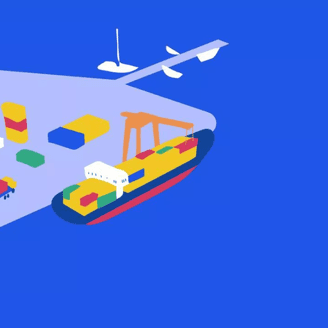- Osome Blog HK
- Your Guide to Hong Kong Shipping and Reliable Logistics Options
Your Guide to Hong Kong Shipping and Reliable Logistics Options
- Modified: 6 May 2025
- 6 min read
- Better Business, Ecommerce


Osome Content Team
VIP Contributor
Osome has been collaborating with 21 authors from 4 countries. We embrace diversity and are proud that lawyers and founders, journalists and financial analysts choose to work with us.
As a big import/export hub, Hong Kong offers entrepreneurs a lot of choice in logistics partners and arrangements. It’s tricky to know where to start – but with so much choice, there’s bound to be an arrangement that works for you.
Are you an ecommerce retailer with a budding market in Asia? Or have you registered a new business with plans to trade in Asia? Then you’ll likely want to ship through Hong Kong — a cost-effective, fast way to get parcels from China to its neighbours and beyond.
Whether importing into Hong Kong to fulfil online orders or exporting from manufacturing sites through a Hong Kong port, you need to understand the types of logistics providers available. This includes their prices, what services they can provide, and how long it will take.
So what makes Hong Kong such an appealing shipping hub for globally-minded businesses? First, it has long functioned as a free port with more internationally friendly rules and regulations than mainland China.
It’s also one of the largest ports in the world, with a capacity of 20 million TEUs (twenty-foot equivalent cargo storage units) per year. That means lots of options and faster shipping for your business — if you know the right way to operate.
1 Common Shipping Solutions
Finding the right shipping method at the right price point can make or break your bottom line. Take a look at these four types of logistics options:
HK Post
This option is especially useful if you want to ship a small number of items. While the cost is typically lower than other options, companies opting to ship with HK Post might also have less visibility across the delivery process. Shipping internationally this way may take a few weeks or more.
Finding your 3PLs
If you want more flexibility, you can opt to piece together your supply chain out of various 3PLs.
Third-party logistics providers offer shipping, warehousing, or other pieces of logistics support through a network of outsourced partners — but they don’t do it all. If 3PLs are the only logistics partners you use, you will need to manage all other supply chain and import/export tasks on your own.
3PLs can help you coordinate both air freight and sea freight. Air freight is a faster option, but it can come with a hefty price tag to match. Sea freight is usually cheaper yet takes longer, making it a good option if you’re shipping in bulk and aren’t on a make-or-break deadline.
Express couriers
These are the large international shipping services like DHL and FedEx. Express couriers can help you with every step of shipping, from customs to last-mile fulfilment.
Using an express courier is a big leap up from the postal service in terms of services. You can take advantage of their economies of scale pricing, and they have the infrastructure in place to handle all logistics details for you.
With these added capabilities comes a bigger price tag, however. And when it comes to personalisation, you may not get a lot of choice in what happens after the shipment goes out. That is important to keep in mind – if something goes wrong in your supply chain, you're likely not the number one priority for the courier given their high volume of customers.
4PLs
A fourth-party logistics provider can do what the courier does, but with added benefits. They will be able to link you with sea and air freight providers from their contact lists, manage the entire process including paperwork and consult you on the best route.
Associated costs with this type of service can vary greatly, as it depends on your choice of freight providers.
In section 4, we’ll dive into some more of the advantages and disadvantages of each type.
2 Clearing Hong Kong Customs
Before you ship through Hong Kong, make sure you are ready with these three steps to clear customs:
Get together all your paperwork
First, you will need a certification called a TID license if you wish to import into Hong Kong.
Apart from that, you will be required to attach various documents containing details of the shipment. Requirements will vary by courier and country of destination, so make sure you establish what you need with your logistics providers well ahead of time — the more organised you can be, the smoother the shipping process will go.
Figure out what fees you will need to pay
A key benefit of shipping through Hong Kong is that there is no import tax.
Excise duties are only levied on four types of goods: Tobacco, alcohol, hydrocarbon oil, and methyl alcohol.
Ready to ship
After you have all of your materials together and the logistics providers chosen, you may consider doing a test run with a few parcels.
This will help you see roughly how long shipment takes with your selected services while lowering the risks of loss. After a successful test run, you can make any necessary adjustments and begin shipping larger quantities.
3 Ensuring Reliability and Speed — Not One or the Other
If you’re navigating Hong Kong shipping for the first time, paperwork can be a formidable challenge. Required documents at the border will depend largely on your product and details surrounding your shipment, but you are likely to need the following:
- Shipping Quotes
- Commercial Invoices
- Certificates of Origin
- Material Safety Data Sheets
- Shipper Letters of Instruction
- Booking Confirmations
- Booking Confirmations
- Packing Lists
- Packing Lists
How to make sure your paperwork is right
Encountering delays due to missing documents is a serious headache. Avoid missteps with shipping documents with these tips:
- Check with carriers in advance to ensure you fill all their requirements in terms of documentation
- Stay organised by keeping all documents in a central, electronic location (cloud), and attach hard copies to your shipment
- Work with a pro and enlist the help of an experienced partner, such as a courier service, freight forwarder, or 4PL
If you try to do everything yourself, it’s easy to get bogged down in the details. For instance, consider how much time the following can take:
- Filling out paperwork
- Organising all your documentation and licensing in a central place
- Searching for the fastest shipping solutions for your budget
- Piecing together a supply chain on your own
- Integrating IT systems and ensuring visibility with 3PL providers
- Figuring out why a shipment is held up at customs, a warehouse, or a port
- Creating a plan B in the case that a shipment is held up somewhere
When you want to ship quickly and avoid holdups, your best bet is to collaborate with an experienced logistics partner. They have the know-how to streamline shipping operations while meeting your unique business needs.
4 Choosing a Partner
When it comes to choosing a partner, it's all about your company’s needs and the potential partner’s skills and experience. In addition to considerations of cost, most companies should take a close look at how much flexibility they’ll have and how ‘hands-on’ their logistics operations will be. Let’s compare three choices below.
Courier services
A courier service will oversee documentation of your shipment, ship the parcels, and manage customs clearance for you.
Large express courier services can ship your parcels quickly but fall short in terms of flexibility and personalisation for your business. That lack of flexibility means you won't be able to pivot if something needs to be changed quickly.
Freight forwarders
The freight forwarder arranges the import and export for your shipment and links you with third-party logistics providers.
The fact that you have the freedom to select your 3PLs from a network means that you will have a good deal more flexibility and control over your supply chain. While more freedom means more to manage in-house, this added flexibility can help your business in the long run if something unexpected happens.
4PL providers
Like the courier, a fourth-party logistics provider will take care of your entire supply chain for you.
But instead of being limited to internal logistics services provided by a single company, the 4PL works with a network of logistics provider partners — and you can pick and choose who to work with. This gives you a few added benefits, including:
- Adaptability for when something goes wrong and you need to find a new local logistics provider quickly
- Single-point system integration, meaning you don’t need to figure out how to integrate your IT systems with numerous 3PL providers. Instead, the 4PL integrates everything for you
- Flexibility to choose providers from the 4PL network, which can help you get the right rate to match your individual business needs
Although there’s no one-size-fits-all method to getting Hong Kong to shipping in Hong Kong, there are a few steps companies of all sizes should take. Whether you’re an ecommerce upstart or an experienced company expanding to new markets, you should always assess your business needs as they evolve, choose knowledgeable partners, and keep up to date with rules and regulations. Our experienced Hong Kong accountants can provide the business support you need.
Want to learn even more about the Hong Kong business landscape? Get the latest insights from our blog.






